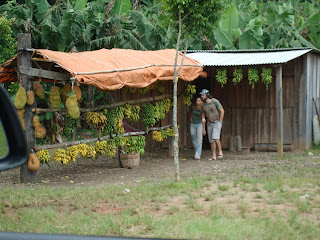Considering I have only 5 t-shirts and 3 pairs of shorts, one of which is a swim suit, and laundry gets done every 2 to 3 weeks, there is really no other option than to "dress down". The next step down is not showering, and I don't think that is necessary, though it does happen from time to time. Basically I should try and avoid looking like a tourist with money. My question is, does this look like someone with their act together?
Very poor neighborhoods known as "favelas" ... are sites of uncontrolled criminal activity and are often not patrolled by police. U.S. citizens are advised to avoid these unsafe areas.
After pondering this for a few moments, I came to the conclusion that they are just saying use common sense. For example, if you see someone carrying a big automatic weapon, don't walk towards them; walk away. Fortunately my mom instilled in me a healthy sense of precaution, maybe not as much as she would like, but enough to keep me from putting myself in certain senseless situations.
All joking aside, it really is important to take into consideration the travel warnings and stories of crime and social disorder when traveling through an area. On the other hand, you cannot let all the possible bad things that could happen to you keep you from going. New York can be pretty scary, but it's worth a visit.
In contrast to my initial fears, I slept through the border crossing while the bus company dealt with border formalities for both Uruguay and Brazil, the only guns I've seen were in the hands of armored truck guards transporting money to and from an ATM (which I feel is normal enough), and I have managed to pick up enough Portuguese to buy bananas on the side of the road.
I spent my first week in the comfort of a hostel where English was spoken. Most hostels, especially in touristy areas, have English-speaking staff. I wanted to ease into needing Portuguese to acquire the essentials for a sustainable existence. It has its other benefits as well. One of the best things about the hostel scene in tourist spots is the incredible diversity of people and points of view from all over the world. Here is a condensed list of the people I met while in Florianópolis: droves of Argentinians, a few Isrealis, an Italian geologist on vacation, Australians, an Austrian who lives in Brazil for half the year, a group of young English chums, an Irish dentist who gave me a much-appreciated free consultation on my impacted wisdom tooth, a Dutch girl that I first met in Bariloche back at the beginning of February, two sweet Swedish girls, a smily middle-aged Swiss arquitect, a Portuguese guy, a German with dreadlocks, a Japanese cyclist who had been traveling by bike for the last year and a half starting in Canada, a multilingual French guy who ended up being my adventure guide and translator for the first few days, and of course Brazilians. By the way, the Brazilians that I have met generally seem to be jolly, kind, giving people. One of the reception workers at the hostel who is from Floripa offered me a free lesson in Portuguese and gave me a book of poetry by one of Brazil's most beloved poets, Fernando Pessoa. It has been a useful and enjoyable study tool. It is also probably essential to my ability to buy those bananas on the road trip from Florianópolis to Piracicaba. So, a big thanks to Flavia.
That smile was a simple thank you, but it held a certain degree of contentment that made me wonder about her way of life and how happy it makes her. There is no one right or wrong way to live. If the goal is to be happy, who is to say what way of life brings that about? We are predisposed to thinking that these people are less fortunate than us, but that judgment depends on how you define success. We would assume that someone who collects cans for a few cents each is not financially successful, but if she has her basic needs met and is content with having nothing more, then she must be successful. My point is that I don't know because without a common language, I had no way of knowing anything more about her, but the experience made me reevaluate some assumptions. I found a poem by Pessoa that might shed some light:
Un dia de chuva é tão belo como um dia de sol.Fortunately, this is close enough to Spanish that I can offer a translation:
Ambos existem, cada um como é.
A day of rain is as beautiful as a day of sun.-Fernando Pessoa
Both exist, each one as it is.





looks good in your posting.
ReplyDeleteThat will be necessary for all. Thanks for your posting.
Bathmate